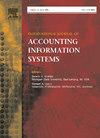Digital transformation and cybersecurity risks
IF 6
3区 管理学
Q2 BUSINESS
International Journal of Accounting Information Systems
Pub Date : 2025-06-05
DOI:10.1016/j.accinf.2025.100749
引用次数: 0
Abstract
This study analyzes the impact of integrating cybersecurity measures on the financial performance of banks. Utilizing regression analysis with data from 100 financial institutions, the findings reveal that banks prioritizing cybersecurity perform better financially. This study demonstrates that it is the quality and strategic integration of cybersecurity measures, as revealed through disclosures, that significantly influence financial outcomes, rather than the sheer scale of investment. A subsample analysis suggests that larger banks appear more resilient to cybersecurity threats due to scale-related advantages, while smaller banks can also improve their financial performance by adopting proportionate, strategically aligned cybersecurity measures. Effective cybersecurity integration correlates with improved financial metrics such as return on assets and equity. Furthermore, the severity of cybersecurity incidents negatively impacts financial performance, emphasizing the importance of proactive risk management. This study underscores the critical role of cybersecurity in financial strategy, enabling banks to navigate digital transformation challenges effectively.
数字化转型和网络安全风险
本研究分析整合网络安全措施对银行财务绩效的影响。通过对100家金融机构的数据进行回归分析,研究结果显示,优先考虑网络安全的银行在财务上表现更好。本研究表明,影响财务结果的是网络安全措施的质量和战略整合,而不是单纯的投资规模。子样本分析表明,由于规模相关优势,大型银行似乎更能抵御网络安全威胁,而小型银行也可以通过采取相称的、战略一致的网络安全措施来改善其财务绩效。有效的网络安全整合与改善的财务指标(如资产和股本回报率)相关。此外,网络安全事件的严重程度对财务绩效产生负面影响,强调了主动风险管理的重要性。该研究强调了网络安全在金融战略中的关键作用,使银行能够有效应对数字化转型挑战。
本文章由计算机程序翻译,如有差异,请以英文原文为准。
求助全文
约1分钟内获得全文
求助全文
来源期刊
CiteScore
9.00
自引率
6.50%
发文量
23
期刊介绍:
The International Journal of Accounting Information Systems will publish thoughtful, well developed articles that examine the rapidly evolving relationship between accounting and information technology. Articles may range from empirical to analytical, from practice-based to the development of new techniques, but must be related to problems facing the integration of accounting and information technology. The journal will address (but will not limit itself to) the following specific issues: control and auditability of information systems; management of information technology; artificial intelligence research in accounting; development issues in accounting and information systems; human factors issues related to information technology; development of theories related to information technology; methodological issues in information technology research; information systems validation; human–computer interaction research in accounting information systems. The journal welcomes and encourages articles from both practitioners and academicians.

 求助内容:
求助内容: 应助结果提醒方式:
应助结果提醒方式:


